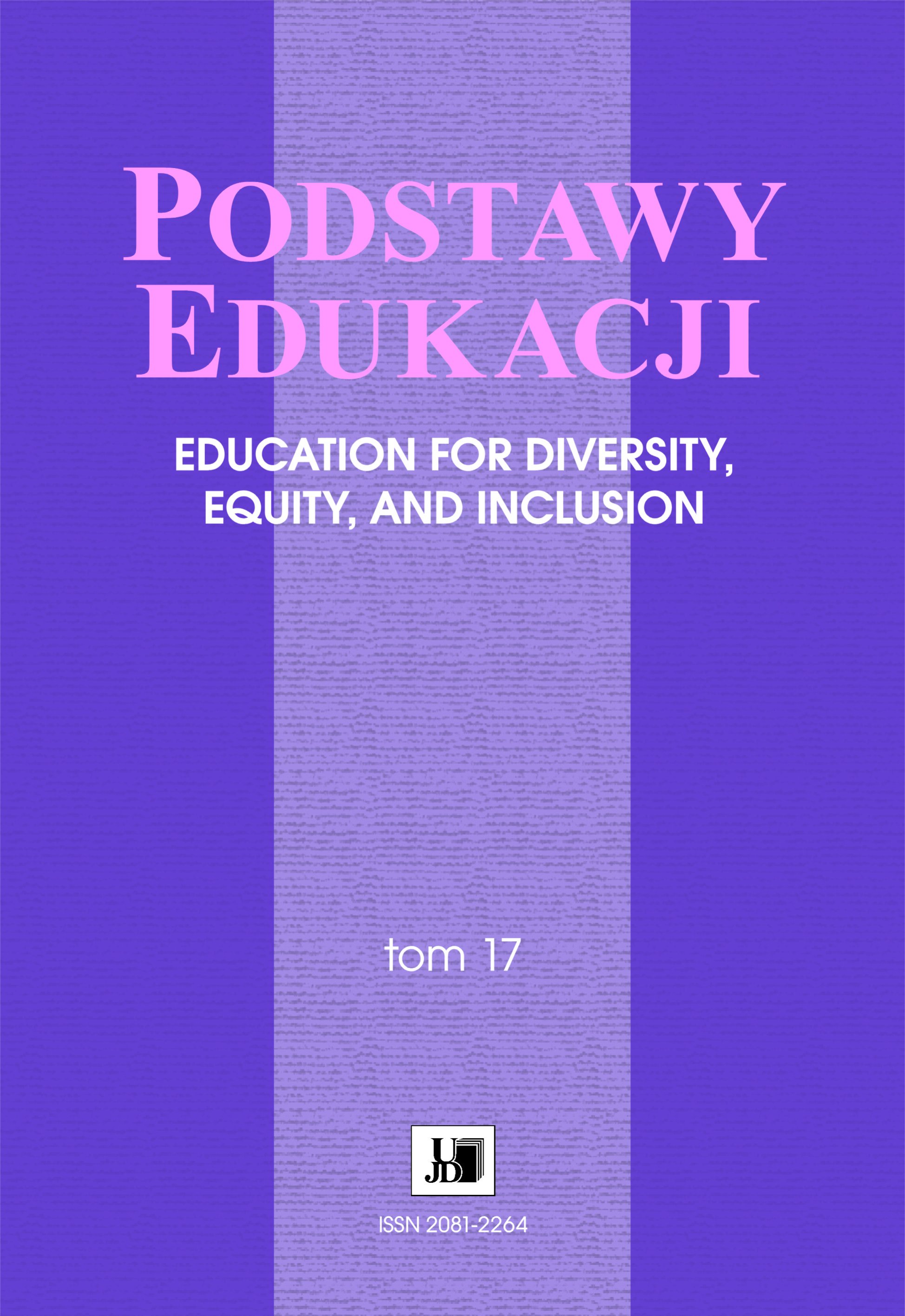Abstract
This article presents the results of the author's research, which aimed to identify how parents perceive career Counsellor's assistance in the choice of post-primary school and to what extent labour market forecasts are considered in the decision-making process. The research results correspond with the view presented from the perspective of their children published in the article "Career Counsellor's Assistance to Students in the Choice of Post-primary School and Profession Sought in the Labour Market" (Pardej, 2024a). The qualitative research used the interview method. The analysis of the research material was conducted using the MAXQDA 2022 program. The research sample consisted of parents of first-year students of Warsaw technical schools studying the professions of the future N=53 (Monitor Polski, Journal of Laws, 2023, item 145). Regarding the choice of secondary school and profession, parents and their children most often use the services of a career counsellor at primary school (40 coded segments). In many families, however, the decision-making process occurs without consulting a career counsellor (28 coded segments). According to parents, their children are more likely to seek the help of a career counsellor at school than at the psychological-educational counselling centre because of the long-term contact, followed by the child's openness to cooperation. Parents see many areas for improvement regarding the competence of career counsellors and the lessons they teach. Parents have a (usually everyday) knowledge of the labour market and desired occupations (30 coded segments). If they check labour market forecasts, they often do so together with their children (12 coded segments) or give up this activity (23 coded segments). In contrast, occasionally, they do so alone (either children or parents).
References
Akpochafo, G.O. (2020). Career Decision-making Difficulties among Secondary School Students in Nigeria. Universal Journal of Educational Research, 8(11B), 5918–5925. http://doi.org/10.13189/ujer.2020.082226.
Anghel, E., Gati I. (2019). The associations between career decision-making difficulties and negative emotional states. Journal of Carrer Development, 48(4), 1–15. https://doi.org/10.1177/0894845319884119.
Argyropoulou, C., Katsioula P., Drosos, N., Kaliris, A. (2018). Χαρακτηριστικά λή ψης επαγγελματικών αποφάσεων και θάρρος :Η περίπτωση μαθητών /μαθητριών σε Γενικά Λύκεια του Κιλκίς. Επιθεώρηση Συμβουλευτικής – Προσανατολισμού, τεύχος, 115, 23–38.
Bacanli F. (2016). Career decision-making difficulties of Turkish adolescents. Int J Educ Vocat Guidance, 16, 233–250. http://doi.org/10.1007/s10775-015-9304-8.
Chłoń-Domińczak, A. (ed.) (2015). Edukacja i rynek pracy. Warszawa: Instytut Badań Edukacyjnych.
Ericson H.H. (2017). How do parents choose schools, and what schools do they choose? A literature review of private school choice programs in the United States. Journal of School Choice, 11(4), 491–506. https://doi.org/10.1080/15582159.2017.1395618
Grabowska, M., Gwiazda, M. (ed.). (2019). Młodzież 2018. Warszawa: Centrum Badania Opinii Społecznej.
Hausman Ch.S., Goldring E.B. (1997). Parent Involvement and Satisfaction in Magnet Schools: Do Reasons for Choice Matter? Orlando: Educational Resources Information Center.
INDEKS Ośrodek Badań Społecznych (2017). Plany zawodowe i oczekiwania uczniów ostatnich klas szkół ponadgimnazjalnych z terenu powiatu kościerskiego. Poznań: Powiatowy Urząd Pracy w Kościerzynie.
Kamieniecka, M. (2015). Decyzje edukacyjno-zawodowe uczniów szkół gimnazjalnych. Raport podsumowujący. Warszawa: Instytut Badań Edukacyjnych.
Klementowska, A. (2018). Aktywność uczniów w zakresie wyboru drogi edukacyjno-zawodowej na III etapie edukacyjnym. Polskie Towarzystwo Profesjologiczne, 1, 163–170.
Kruszakin, B. (2017). Raport z ankiet. Ważne decyzje wybór szkoły. Dane z roku szkolnego 2016/2017. Warszawa: Ośrodek Rozwoju Edukacji. Wydział Edukacji dla Rynku Pracy.
Frąszczak, B., Głowacka M., Kąkolewski, A., Kroczak, H., Łuczak, M., Zasada, D. (2022). Ewaluacja standardów doradztwa zawodowego dla szkół podstawowych. Raport z badania. Poznań: Centrum Doradztwa Zawodowego dla Młodzieży. Obserwatorium Gospodarki i Rynku Pracy Aglomeracji Poznańskiej.
Łukasiewicz-Wieleba, J., Baum A. (2013). Rodzicielskie sposoby rozpoznawania i rozwijania zainteresowań i zdolności. Warszawa: Wydawnictwo Akademii Pedagogiki Specjalnej.
Maree, J.G., Magere G.M. (2023). Group career construction counselling influences Tanzanian high school students’ career decision-making difficulties. International Journal of Adolescence and Youth, 28(1), 2190809, 20–34. https://doi.org/10.1080/02673843.2023.2190809.
Pardej, K. (2024a). Pomoc doradcy zawodowego uczniom w wyborze szkoły ponadpodstawowej oraz zawodu poszukiwanego na rynku pracy. Rynek Pracy, 1(188), 89–106. http://doi.org/10.5604/01.3001.0054.4578.
Pardej, K. (2024b). Difficulties in choosing a secondary school in the opinion of parents. Seminare. Poszukiwania Naukowe, 45(1), 1–15. http://doi.org/10.21852/sem.1819
Pisula, D. (2009). Poradnictwo kariery przez całe życie. Warszawa: Krajowy Ośrodek Wspierania Edukacji Zawodowej i Ustawicznej.
Podwójcic, K. (2015). Diagnoza stanu doradztwa edukacyjno-zawodowego w gimnazjach i szkołach ponadpodstawowych w relacjach dyrektorów szkół i osób realizujących doradztwo. Warszawa: Instytut Badań Edukacyjnych.
West, A., David, M., Hailes, J., Ribbens, J. (1995). Parents and the Process of Choosing Secondary Schools: Implications for Schools. Educational Management and Administration, 23(1), 28–38.
Wiekiera-Michau M. (elaborated) (2020). Raport z badania ewaluacyjnego dotyczącego oceny wsparcia skierowanego do uczniów w Szkolnych Punktach Informacji i Kariery w ramach projektu „Modernizacja Kształcenia Zawodowego w Małopolsce II. Kraków: Urząd Marszałkowski Województwa Małopolskiego. Departament Edukacji.
Wojtasik, B. (2011). Podstawy poradnictwa kariery. Poradnik dla nauczycieli. Warszawa: Krajowy Ośrodek Wspierania Edukacji Zawodowej i Ustawicznej.
Zintegrowana Strategia Umiejętności 2030 (część szczegółowa). Polityka na rzecz rozwijania umiejętności zgodnie z ideą uczenia się przez całe życie (2020). Warszawa: Ministerstwo Edukacji i Nauki.
Netography
https://dziennikustaw.gov.pl/M2023000014501.pdf [access: 1.02.2023].
https://isap.sejm.gov.pl/isap.nsf/download.xsp/WDU20190000325/O/D20190325.pdf [access:20.02.2019].

This work is licensed under a Creative Commons Attribution 4.0 International License.
Copyright (c) 2024 Katarzyna Pardej
